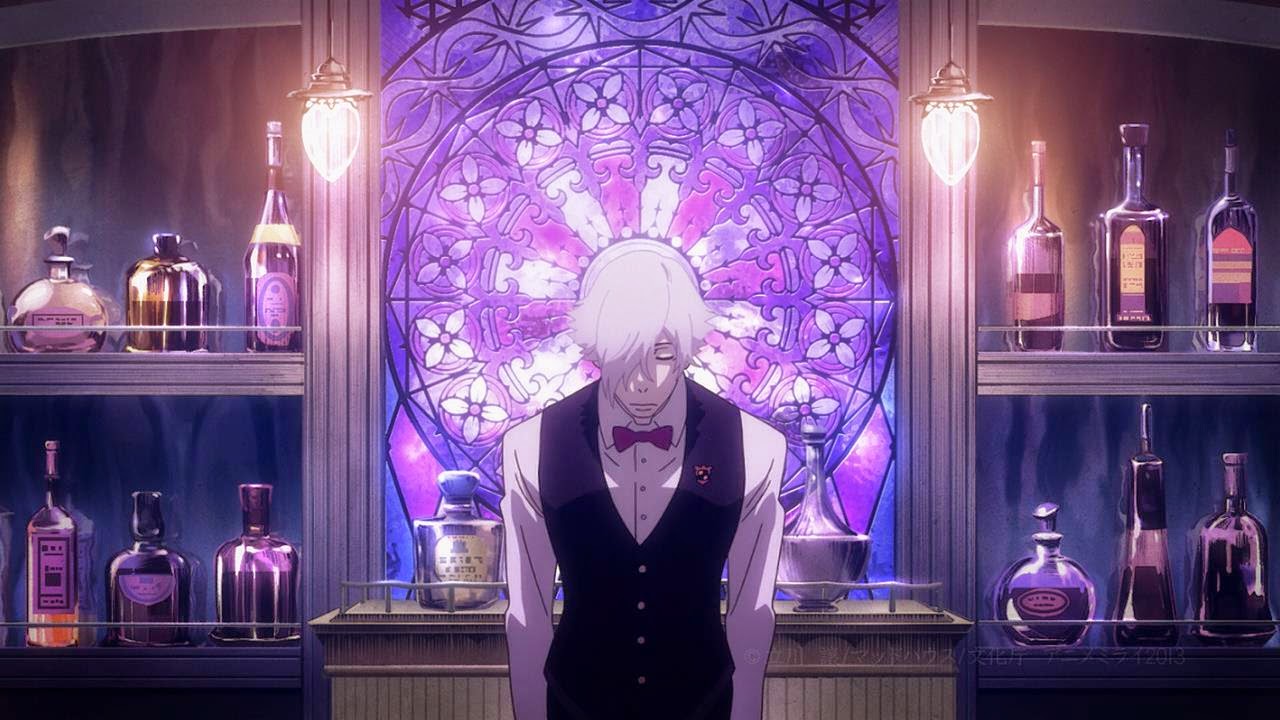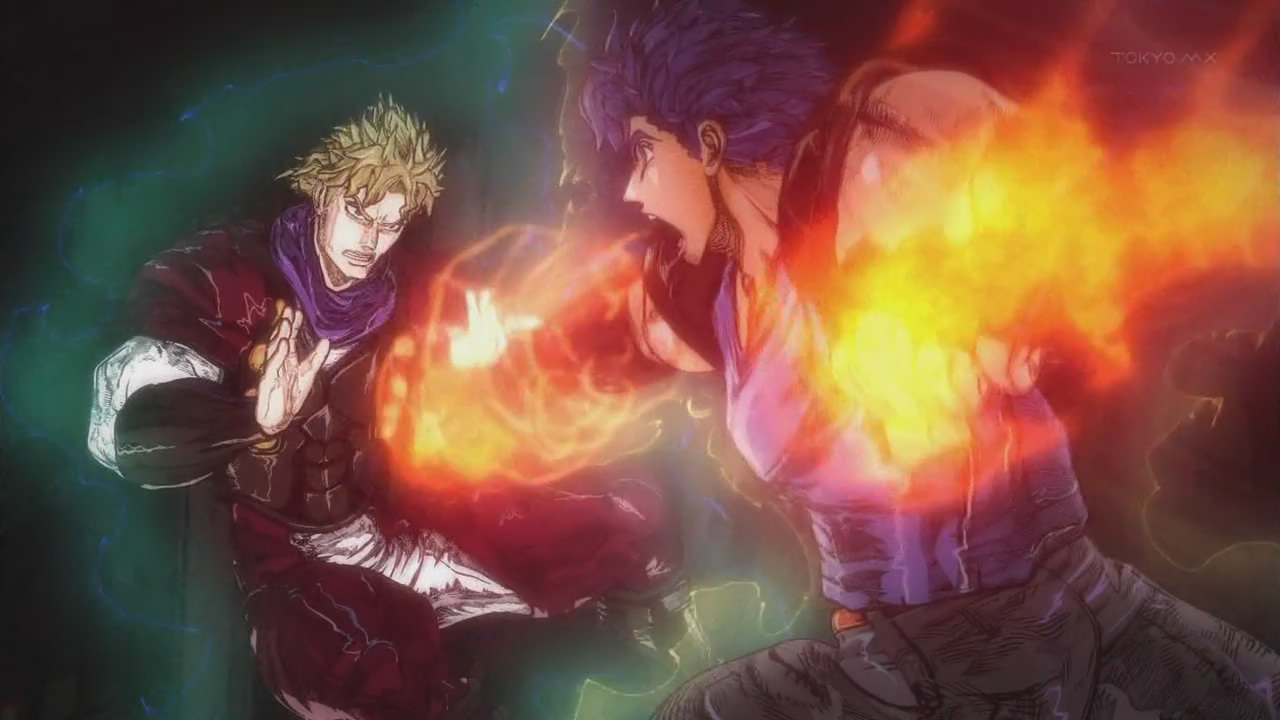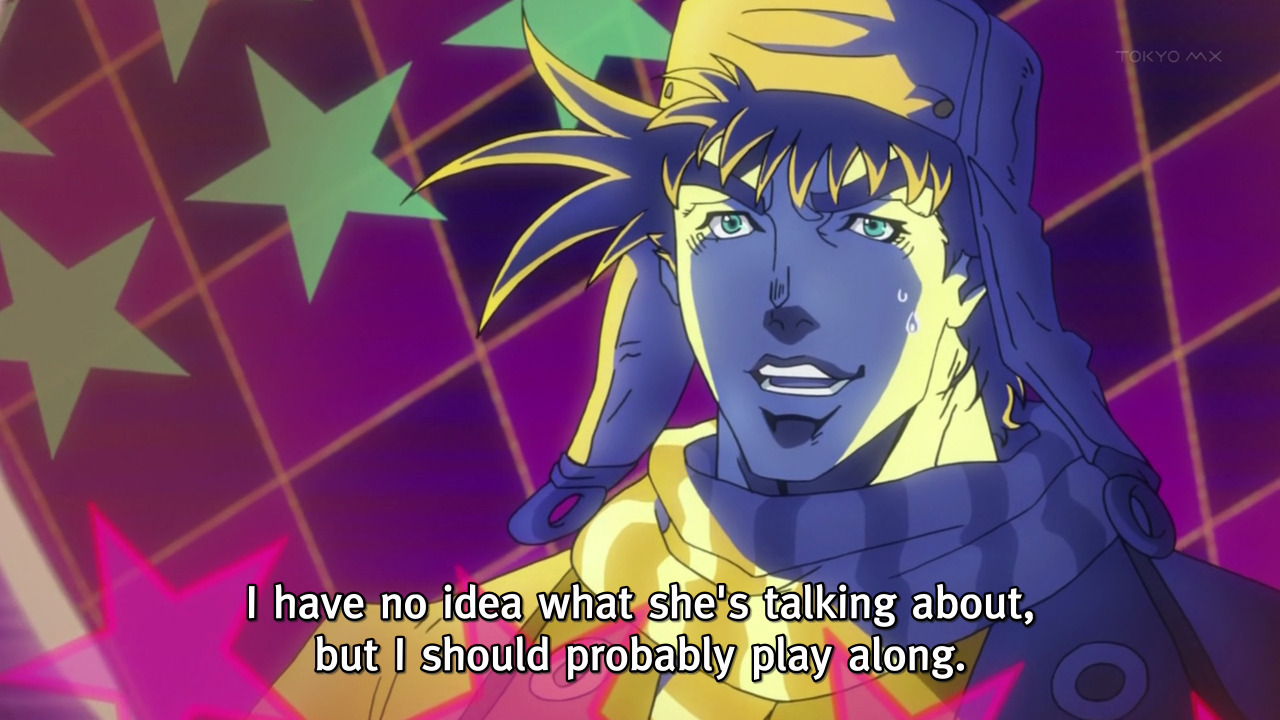Video Version:
Warning: There will be spoilers in this post, because I personally believe that it is impossible to critique this show without diving into specifics. You have been warned. For those of you who’ve seen Death Parade or don’t care, let’s get started.
Hey, thanks for waiting for new content outside of Fangirl February or Seasonal Content! I’m sure you’re all excited, so let’s begin.
Every once in a while you come across an anime that starts off fantastic, but slowly falls off the cliff of anime greatness. That show may have fantastic ideas, be very enjoyable to watch, have interesting characters, a phenomenal presentation, and an abundance of potential. But, eventually, something goes wrong, and you can't help but question what went astray. Maybe the ideas weren't executed properly, or the characters were not as well written as you once imagined. After I watched the topic of today's review, I couldn't stop thinking about those kind of things. So, in order to organize my thoughts, I decided to write a review, which eventually turned into an analysis. That anime is a show that aired in the Winter 2015 season: Death Parade. Let the review commence.
Every once in a while you come across an anime that starts off fantastic, but slowly falls off the cliff of anime greatness. That show may have fantastic ideas, be very enjoyable to watch, have interesting characters, a phenomenal presentation, and an abundance of potential. But, eventually, something goes wrong, and you can't help but question what went astray. Maybe the ideas weren't executed properly, or the characters were not as well written as you once imagined. After I watched the topic of today's review, I couldn't stop thinking about those kind of things. So, in order to organize my thoughts, I decided to write a review, which eventually turned into an analysis. That anime is a show that aired in the Winter 2015 season: Death Parade. Let the review commence.
Background:
Death Parade has an interesting backstory, to say the least. It all began in 2013 with a short movie called Death Billiards. Now, I watched Death Billiards having little to no idea of what to expect, and came out absolutely loving the movie. The psychological elements, the characters that felt human despite how unfavorable their personalities were, and the intensity of the movie completely blew me away, and I had the movie on my favorites for quite some time. So, when it was announced that an anime series based on the short called Death Parade was coming out, I flipped. I was excited beyond belief, wishing that the show would deliver the same experience as the short, while also being able to separate itself in some way. Well, I got what I wished for, but the end result wasn’t very satisfactory, at least for me. However, for the sake of fairness, let’s start off with the good aspects of the show.
 |
| Death Parade originated from Death Billiards, a wonderful animated short movie. |
The Good:
Something that Death Parade absolutely nails is style and atmosphere. The coloring and lighting in this show is perfect, with every frame being filled with some sort of movement or action, whether it be background or character animation. The main color Death Parade likes to sport is purple, which I’ve noticed is a trend with Madhouse productions. Like, No Game No Life’s main color was red, Parasyte’s was beige, and Paprika’s was deep red. Interesting. Anyway, the character designs are all very well done, with each character feeling distinct and defined. I especially like the arbiter’s eyes; they were always interesting to look at, and these features distinguished them from the human characters. The soundtrack is also pretty nice, though forgettable for the most part, except for the opening and the ending. I would try singing the opening, but, well, I can’t pronounce Japanese for my life.
Another thing Death Parade does well is some of its individual episodes. Like in Death Billiards, the character dynamics and backstories are the best parts of this anime. My favorite episodes were 3, for its sweet tone and incredibly sympathetic characters, episode 4, for its tragic characters, and episodes 8 and 9, for actually being better than Death Billiards in execution and emotional investment. These characters and their interactions can really make you think about the human condition, and how far people will go to protect the ones they love. The concept also has a way of getting in your head, asking you what you’d do in the situation presented. Would you go the selfless route, allowing the other person to be reincarnated, or would you fight for yourself? Are you truly as selfless as you thought? Would you go to the void on behalf of the other person? It’s an infectious idea that can really make you think and question yourself, which is an ingenious feat on the writer’s behalf. I’ve heard some people complain that these characters’ development is forced, but I always thought that they were supposed to feel that way. These characters are forced to participate in a game that unleashes their inner darkness, so if it feels forced, then the show's doing something correctly. The entire scenario is unnatural, which drives home the show’s main idea that people should not be judged in this fashion, so I think the show succeeds in this regard.
 |
| A screenshot from Episode 3, one of my personal favorite episodes of the anime |
Death Parade is also very enjoyable to watch. The way the show makes you think and consider what’s happening can be very gratifying. It makes the viewers feel intelligent for figuring out what’s happening, and I always respect a show that takes its audience seriously. Though, another thing that makes Death Parade enjoyable is how accessible it is. While the show does make you think, its concepts are usually easy to understand or are clearly explained, which allows for more people to enjoy it. It’s not like the insane Kyousougiga or esoteric Ergo Proxy where you really have to pay attention to understand what’s going on, which is good for both a mainstream audience and people looking for something a little deeper than their average shonen action show. I’m actually quite happy that Death Parade has become so popular, because it’s a step forward for the anime community as a whole. It shows that people want anime like this, and hopefully in the future, we will get better and better anime that don’t rely on clichés or fanservice. However, as much as I want to love this show, there are some problems that really hold the show back from being something brilliant. So, enough beating around the bush, let’s get on to what you’ve all been waiting for: me ripping the bad aspects to shreds.
 |
| It's PONDERING TIME! |
The Bad:
I think my main problem with Death Parade isn’t necessarily the ideas or concepts presented, but more on the execution of these ideas. As I stated earlier, the concepts are easy to understand, but the story makes absolutely no sense. The idea that the arbiters are emotionless robots who judge people without bias is a great one, but the way the show displays this is incredibly confusing. For example, you see Ginti and Nona express emotions whenever they’re on screen. Nona is sly, intelligent, and obviously feels like something is wrong with the system they’re a part of. Ginti, on the other hand, feels hatred for humans, and loves torturing them during judgments. However, the one Arbiter that apparently develops human emotions is Decim, who is ironically the most deadpan and emotionless character in the entire show. That makes no sense. Maybe instead of labeling the arbiters as emotionless, maybe the arbiters should have only expressed negative emotions, which impairs their judgment. This would make a bit more sense, since one of the plot points brought up at the end of the show is that arbiters are actually the people who came from the void. And this problem of misguided execution appears more than once in the show.
 |
| So, Decim gains emotions over the course of the show...but the other arbiters clearly express emotion, and Decim's personality is incredibly deadpan. |
Another example is in episode 2, when the setup for Death Parade is explained. You notice that Decim has a lapse in judgment, and sent the wrong person to the void after the judgment. This should have set up a theme relating to how we can’t judge people based on select memories and being put under pressure, but more on how they are as people. But, that doesn’t really happen. At the end of the show, people are still judged based on their performances in games, except Decim will treat it with more passion…? Where was this supposed to lead? And, okay, before anyone criticizes me, I get that the system isn’t supposed to make sense, because that leads to questioning the system, and that these backwards ideas are supposed to be reverse psychology. But the questioning doesn’t change much, and everything kind of goes back to the status quo.
 |
| A screenshot from episode 2, showing how Decim made an error in judgment. Logically, this should lead to the characters questioning the system. |
Then there’s also the idea concerning the search for purpose in life. This is the biggest flaw in terms of narrative for Death Parade, because while the main message at the end is to live life with purpose, the show doesn’t provide a purpose worth living for amidst all the suffering the characters went through. The reason why many people believe in an afterlife is so they can live their lives with purpose, because if you're a good person, you'll get rewarded; but, in Death Parade, in which the setting is clearly in some sort of purgatory, they never bring up a good reward for the tragic lives of the characters. It’s like if you just finished taking the hardest test of your life, and you find out that your reward is either taking an infinite amount of tests or holing up in your basement and doing absolutely nothing. In other words, if you lived your life with purpose, why would you want to live another life just to find another purpose all over again? Why is reincarnation the reward for a life that was well lived? I'm not saying that it can't be, since different people have different goals in life, but Death Parade doesn't answer this question, which is a major issue. This is something that its prequel Death Billiards avoided by not giving specific names to the destinations of the characters. It was left up to interpretation where the people went. While interpreting this, I don’t think it’s much of a coincidence that most people came up with heaven or hell, not reincarnation and the void. Death Parade offers no reward for living through the hardships in life, which completely contradicts the message that you should live your life with purpose, since the show doesn’t give you a good purpose to live your life for! I'm not saying that people can't find their own raison d'êtres in life without the help of an afterlife, but again, Death Parade takes place in a purgatory, and most of the characters shown seemed to be kind-hearted but lived miserable lives. So, why can't they find solace in this afterlife, which is supposed to reward the good and punish the bad? Maybe I'm nitpicking, but I think that it’s a pretty big problem when an anime can’t back up its themes with evidence, which Death Parade does not do.
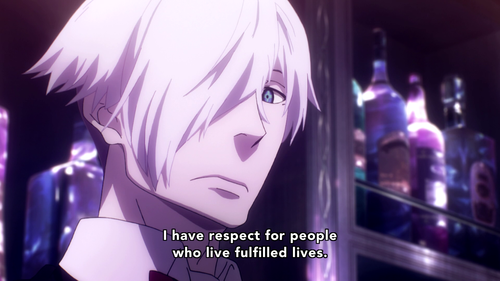 |
| But for what purpose, may I ask? |
You know what movie I kept thinking of while thinking about Death Parade, which actually does this concept much better? Defending Your Life. These two pieces of entertainment are very different in tone and character, since Defending Your Life is primarily a comedy, but they essentially have the same themes and story. Except, in Defending Your Life, when you die and after you’re judged, there are three options: either you’re reincarnated, sent to hell, or sent to a place of higher knowledge and enlightenment. This gets the theme of living your life with purpose across much better than Death Parade, because the judgments are fairer and if your life is deemed purposeless, you have to live again and again until you find purpose, and then get rewarded for it. Then there’s the other option of getting sent to hell, but that’s only if you’re a really bad person. And, on top of that, all the lawyers and employees in the purgatory the movie takes place in were people who went to the place of higher knowledge, which means that the judgments are done by well qualified people. That also makes much more sense than having the terrible people who were sent to the void in Death Parade make the judgments. And before you bring up the argument that Death Parade was supposed to be nihilistic and display how life really has no meaning, think about how Decim constantly says how he respects people who’ve lived a fulfilled life. Why else would a main character say that over and over again other than to get the point across that life should have purpose? Not very agnostic, now, is it?
 |
| A (badly rendered, sorry for the low quality) judgment scene from Defending Your Life |
Next, there are the characters. Oh boy, the characters. Where do I even begin? Honestly, it felt like the show was writing up character motivations as they went along, leading to character arcs that lead nowhere or lead somewhere but not very clearly. Remember Ginti and the girl who’s obsessed with idols? What was their purpose, exactly? It didn’t feel like anything was accomplished with that story arc, which made those episodes feel pretty pointless.
 |
| Behold, the most pointless character of the show! |
And what about the conflict over Decim getting emotions? Decim was never punished for it, and Oculus didn’t do anything after he discovered what was happening. He was just like, “Oh, sure. Nothing to see here!” Aren’t the Arbiters supposed to remain emotionless, and if one gains emotions, it’s kind of a big deal? Why would he just shrug it off then? I don’t remember seeing an explanation for that. Then we get to Decim and Chiyuki. Chiyuki was actually fairly developed, with a sympathetic backstory and reasonable motivations, but her personality is as bland as a piece of cardboard. As for Decim, again, he’s not the worst character in the entire show, and he does have solid development, but the rest of the confusing plot elements holds him down. I will admit, seeing him cry at the end of the show did get to me, though. But, I think that’s yet another problem; focusing on the uninteresting characters over the interesting ones.
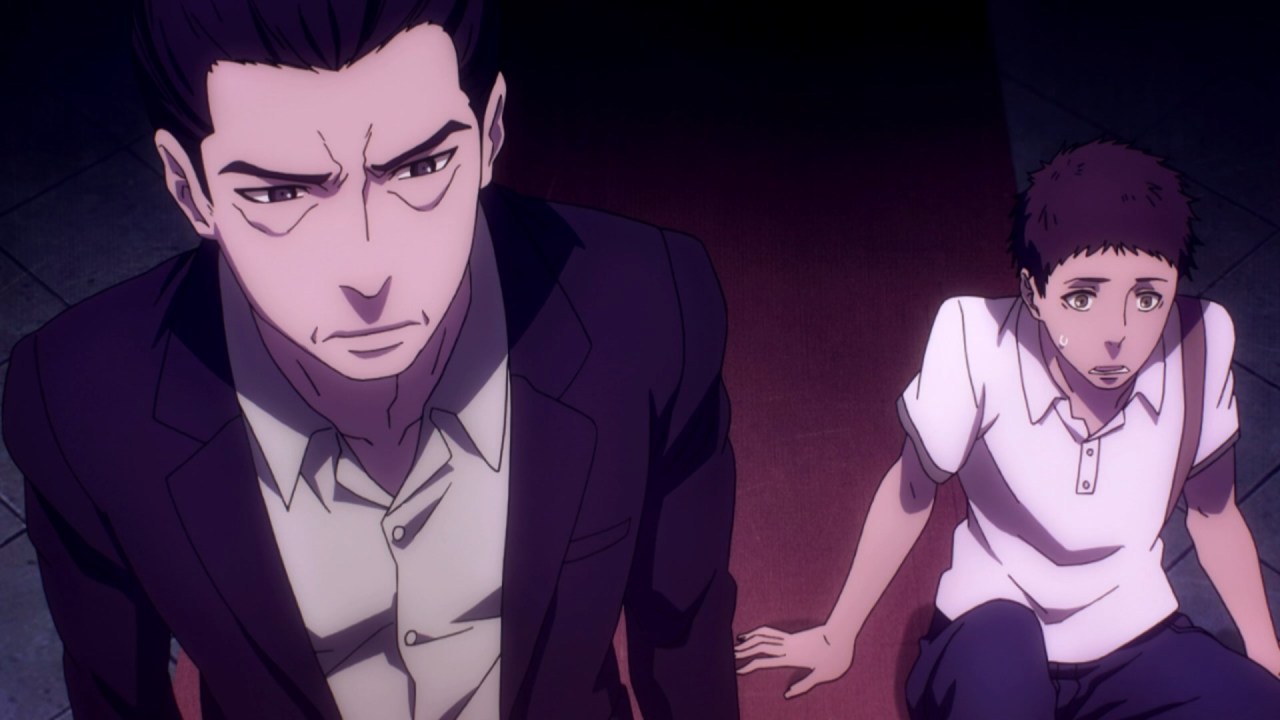 |
| The human characters (like these two from episodes 9 and 10) were great because they displayed human emotions, but the arbiters were uninteresting for the most part. |
In Death Billiards, Decim and Chiyuki were unimportant; they were observers to the events unfolding in front of them. The real meat of the short was the two human characters featured in the movie, as their physical and mental battle is the most intriguing aspect. This same aspect is what made most of the individual episodes great: the human element behind the contestants. When you take that away, you’re left with the bystanders that never played much of a role to begin with, and while the show did try to make them interesting, it went about this in the most nonsensical and confusing ways. And, I think that’s my opinion of Death Parade as a whole: it tried, and I respect it for trying. There are so many anime out there that don’t try, and I would much rather Death Parade be popular than any of the other shows that recently got popular. But, trying can only get you so far, and you have to draw the line somewhere. Death Parade crossed that line, so what we’re left with is a show that tried, but did not succeed.
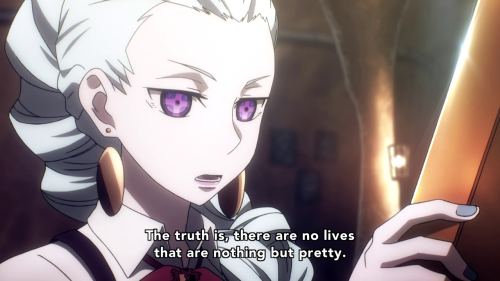 |
| You could also say this about a ton of anime. This one especially. |
Conclusion:
Overall, Death Parade is a thematic mess with a great presentation, but I don’t think it’s the worst thing to ever happen to anime. Honestly, I think the people going around saying this show is absolute garbage are exaggerating, and so are the people who are claiming this is the best show to come out in the Winter Season. Death Parade isn’t bad. It’s very entertaining at its high points and it is original, unlike so many other shows to come out recently. But, it has a whole ton of issues that kept me from really liking the show, which is a shame, because I really wanted to like it. Alas, that didn’t end up happening. I give Death Parade a 5 out of 10. It has its incredibly high points, but those good elements are held down by questionable writing choices and thematic confusion. My final recommendation is to check it out if you want something unique and entertaining, but if you’re looking for a breathtaking psychological anime that studies the human character, you’ll find elements of that, but you’ll probably be disappointed.
Well, that’s all from me. I hope you enjoyed that review/analysis of Death Parade. I’ll see you all in my next post. Until then!



